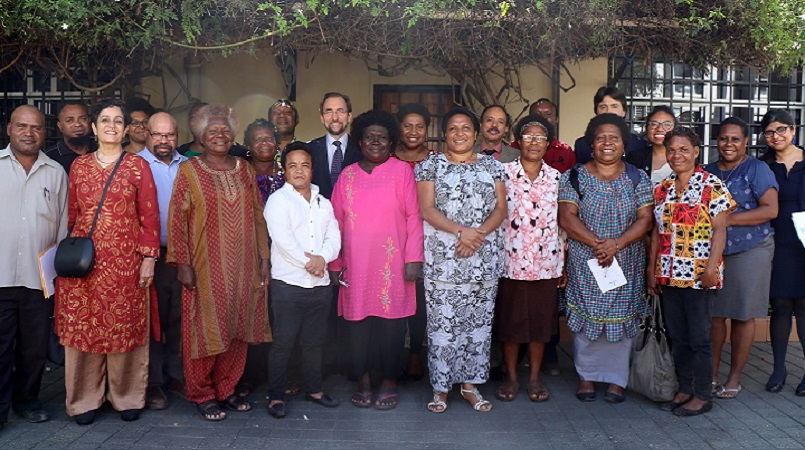
UN High Commissioner for Human Rights Zeid Ra’ad Al Hussein on Friday called on the Government of Papua New Guinea to take firm measures to combat corruption, build good governance and strengthen the rule of law.
This was made particularly in holding businesses accountable for the human rights impacts of their activities.
During a day-long visit to the country at the invitation of the government, the High Commissioner had meetings with Prime Minister Peter O’Neill and other high-level officials, as well as the Chief Justice, Speaker of Parliament and civil society representatives from Port Moresby, Bougainville and the Highlands.
“I am deeply grateful to the Government for its invitation, which in itself shows a welcomed openness,” the High Commissioner said.
“Papua New Guinea appears to be a country of contradictions. There are exemplary laws and policies in place to protect human rights, but they are reportedly often not enforced. It is a resource-rich country, but much of its population lives in abject poverty, with acute malnutrition rates in some areas comparable to Yemen and minimal access to quality healthcare and education. It has strong civil society activists but there is little room for them to influence Government policy,” the High Commissioner said.
“The Government urgently needs to build a stronger nexus with its people, so it can better serve their needs in this vast and diverse land.”
High Commissioner Zeid said it was unacceptable that many businesses had been granted licenses to engage in extractive industries without the free, prior and informed consent of the people living on the affected land, particularly under the Special Agriculture Business Leases (SABL). Many communities have been forcibly evicted from their homes, often reportedly violently, with impunity and allegedly sometimes with the complicity of local police.
“The reported actions of some major corporations engaged in the extractive industries in Papua New Guinea are shameful,” Zeid said, citing also incidence of sexual violence with impunity in some cases. “States have a responsibility to prevent, investigate, punish and redress human rights abuses within their territory, including abuses committed by private corporations. And business enterprises have an obligation to avoid infringing on the human rights of others and to address adverse human rights impacts of their activities.*”
“States and businesses can flourish without trampling brutally on people’s human rights – but in Papua New Guinea, human rights advocates report that local communities rarely get any benefits from the extractive operations carried out by large corporations on their land,” he said.
The State also needs to take resolute action to combat corruption and increase fiscal transparency, the High Commissioner added.
“Good governance is never easy, and is particularly complex in a country like Papua New Guinea, with more than 850 languages and tribes and much of its population in remote, rural areas. But by partnering with civil society, ensuring people are consulted on matters that affect them and holding accountable those within its ranks who breach the law, good governance can be well within reach.”
The High Commissioner recommended that the creation of an independent national human rights institution be expedited to facilitate the interactions between the State and non-governmental organisations. He said he was encouraged by Prime Minister O’Neill’s commitment to push through a bill establishing such an institution, and his stated recognition of the important role of civil society.
“I was, however, troubled to hear about attacks against human rights defenders and journalists working on sensitive issues, particularly relating to land rights and corruption,” Zeid said. “I call on the Government to protect the important watchdog function of civil society, and indeed treating them as partners in tackling difficult human rights challenges, including the endemic gender-based violence and horrific attacks against those accused of sorcery in Papua New Guinea.”
While Papua New Guinea has ratified a number of key international human rights treaties and enshrined their provisions into law, human rights defenders said the laws were often not translated into practice, and law enforcement officials and communities were often unaware of them.
“Legislating on human rights should not be just about ticking the box,” Zeid said. “Governments have a responsibility to breathe life into the provisions of the law by allocating resources to their implementation and harmonizing policy and regulations.”
The High Commissioner commended the creation of National Human Rights Track Court, which gives legal standing to any individual or group that wishes to bring a human rights-related case to court.
The UN human rights chief urged the authorities to formalize its de facto moratorium on the death penalty, stressing that there is no evidence that the death penalty deters crime while there is ample evidence that it results all-too-frequently in miscarriage of justice. He also raised concerns about the plight of the Manus Island asylum seekers and refugees, and asked the Government to identify durable solutions, fully respecting the human rights of each individual.
“As it prepares to host the Asia Pacific Economic Cooperation (APEC) forum this year, Papua New Guinea will be very much in the spotlight,” High Commissioner Zeid said. “We hope to see decisive action on the Government programme to tackle violence related to accusations of sorcery through its Sorcery National Action Plan as well as measures to ensure that vulnerable groups, such as people with disabilities and lesbians, gays, bisexuals and transgender people are able to fully enjoy their human rights.”
“Transparent societies with a strong emphasis on the rule of law, accountability and human rights attract opportunities for growth, and make for more stable societies. My Office – along with many other partners in the international community – stands ready to advise and support the Government of Papua New Guinea in this regard.”
